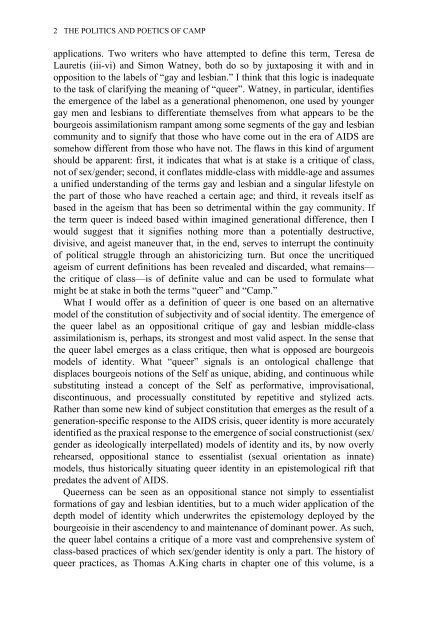Edited by Moe Meyer - Get a Free Blog
Edited by Moe Meyer - Get a Free Blog
Edited by Moe Meyer - Get a Free Blog
Create successful ePaper yourself
Turn your PDF publications into a flip-book with our unique Google optimized e-Paper software.
2 THE POLITICS AND POETICS OF CAMP<br />
applications. Two writers who have attempted to define this term, Teresa de<br />
Lauretis (iii-vi) and Simon Watney, both do so <strong>by</strong> juxtaposing it with and in<br />
opposition to the labels of “gay and lesbian.” I think that this logic is inadequate<br />
to the task of clarifying the meaning of “queer”. Watney, in particular, identifies<br />
the emergence of the label as a generational phenomenon, one used <strong>by</strong> younger<br />
gay men and lesbians to differentiate themselves from what appears to be the<br />
bourgeois assimilationism rampant among some segments of the gay and lesbian<br />
community and to signify that those who have come out in the era of AIDS are<br />
somehow different from those who have not. The flaws in this kind of argument<br />
should be apparent: first, it indicates that what is at stake is a critique of class,<br />
not of sex/gender; second, it conflates middle-class with middle-age and assumes<br />
a unified understanding of the terms gay and lesbian and a singular lifestyle on<br />
the part of those who have reached a certain age; and third, it reveals itself as<br />
based in the ageism that has been so detrimental within the gay community. If<br />
the term queer is indeed based within imagined generational difference, then I<br />
would suggest that it signifies nothing more than a potentially destructive,<br />
divisive, and ageist maneuver that, in the end, serves to interrupt the continuity<br />
of political struggle through an ahistoricizing turn. But once the uncritiqued<br />
ageism of current definitions has been revealed and discarded, what remains—<br />
the critique of class—is of definite value and can be used to formulate what<br />
might be at stake in both the terms “queer” and “Camp.”<br />
What I would offer as a definition of queer is one based on an alternative<br />
model of the constitution of subjectivity and of social identity. The emergence of<br />
the queer label as an oppositional critique of gay and lesbian middle-class<br />
assimilationism is, perhaps, its strongest and most valid aspect. In the sense that<br />
the queer label emerges as a class critique, then what is opposed are bourgeois<br />
models of identity. What “queer” signals is an ontological challenge that<br />
displaces bourgeois notions of the Self as unique, abiding, and continuous while<br />
substituting instead a concept of the Self as performative, improvisational,<br />
discontinuous, and processually constituted <strong>by</strong> repetitive and stylized acts.<br />
Rather than some new kind of subject constitution that emerges as the result of a<br />
generation-specific response to the AIDS crisis, queer identity is more accurately<br />
identified as the praxical response to the emergence of social constructionist (sex/<br />
gender as ideologically interpellated) models of identity and its, <strong>by</strong> now overly<br />
rehearsed, oppositional stance to essentialist (sexual orientation as innate)<br />
models, thus historically situating queer identity in an epistemological rift that<br />
predates the advent of AIDS.<br />
Queerness can be seen as an oppositional stance not simply to essentialist<br />
formations of gay and lesbian identities, but to a much wider application of the<br />
depth model of identity which underwrites the epistemology deployed <strong>by</strong> the<br />
bourgeoisie in their ascendency to and maintenance of dominant power. As such,<br />
the queer label contains a critique of a more vast and comprehensive system of<br />
class-based practices of which sex/gender identity is only a part. The history of<br />
queer practices, as Thomas A.King charts in chapter one of this volume, is a


